The eCommerce landscape is evolving at a rapid pace and keeping up with the latest buying trends and consumer habits can be difficult.
In this post we’ll be sharing 22 eCommerce stats as well as providing actionable advice on how to utilize these facts to improve your results.
Knowing the key facts about the eCommerce industry could give you a huge advantage over your competitors and help you make better decisions.
Let’s dive into these valuable insights and see how they can benefit your business!
Knowledge is power: Discover 22 #eCommerce stats that can help you make better business decisions.
- eCommerce secrets: Statistics and trends you should be aware of
- 49% of worldwide eCommerce transactions are made via digital wallets
- Global “buy now pay later” value will be x10 in 2026 compared to 2020
- 45% of consumers search online before a major purchase
- Shopping via online streams is becoming increasingly popular across the globe
- 61% of consumers prefer to be contacted by brands via email
- 62% of customers won’t buy from you again if your store is not optimized for mobile
- 70% of carts in online stores are abandoned
- Buyers are becoming greener
- Afternoon and Friday are your allies for increasing sales
- 8 out of 10 people won’t buy from you again after just one bad experience
The importance of data
There is a whole universe of statistics and evidence out there.
Some will be useful, some not so much. But:
- Data-driven decision-making can help you make smarter and more informed business actions by reducing subjective bias.
- You’ll be able to discover patterns and trends that may otherwise be difficult to detect.
- It leads you to make more rational decisions, which can help you improve your business performance or mitigate risks you may not see coming.
Let’s explore these 22 eye-opening eCommerce stats in 2025 and see how you can start using them in your business today.
Sources
The data presented here are taken from studies and analyses carried out by different companies.
Where possible we’ll use global data, although sometimes the information is only available for the U.S. market.
eCommerce secrets: Statistics and trends you should be aware of
Here are all the facts we’ve compiled that can be useful to you, listed in no particular order.
49% of worldwide eCommerce transactions are made via digital wallets
According to Statista and many other sources, credit and debit card checkouts are falling behind in favor of digital wallets.
In 2021 purchases completed using this method were nearing the halfway mark.
It’s likely that by the time you are reading this the 50% will have been surpassed, as the estimate was 53% by 2025.
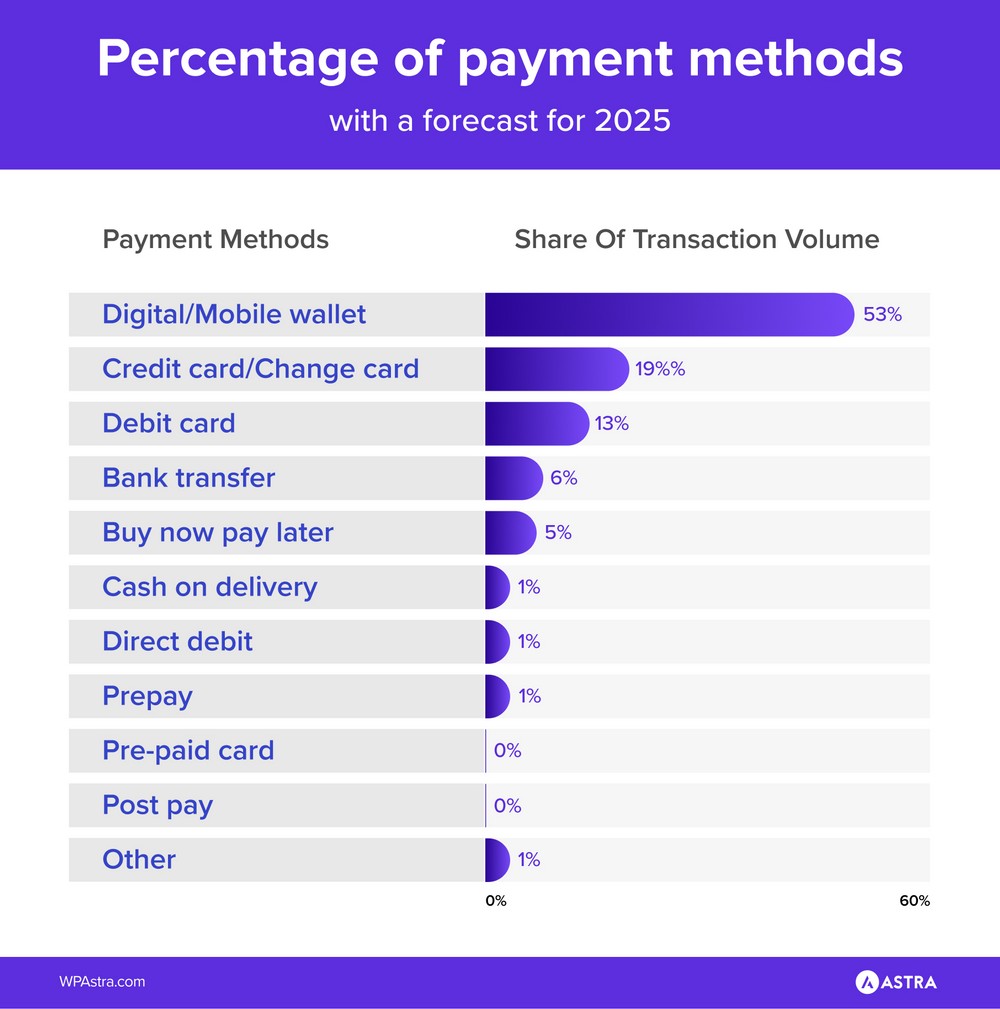
Takeaway
Give potential buyers as many payment methods as you can, making sure that digital wallets such as Apple Pay and Google Pay are included.
If you use Stripe as your payment processor you can easily activate these two digital wallets.
If your payment or eCommerce solution doesn’t allow you to use this payment method, consider switching to a better one.
Global “buy now pay later” value will be x10 in 2026 compared to 2020
In the table above you saw that “buy now pay later” (BNPL) has a 5% global market share.
This payment method is not as popular as digital wallets but it can be equally relevant.
This trend should be especially taken into account if you sell expensive products.
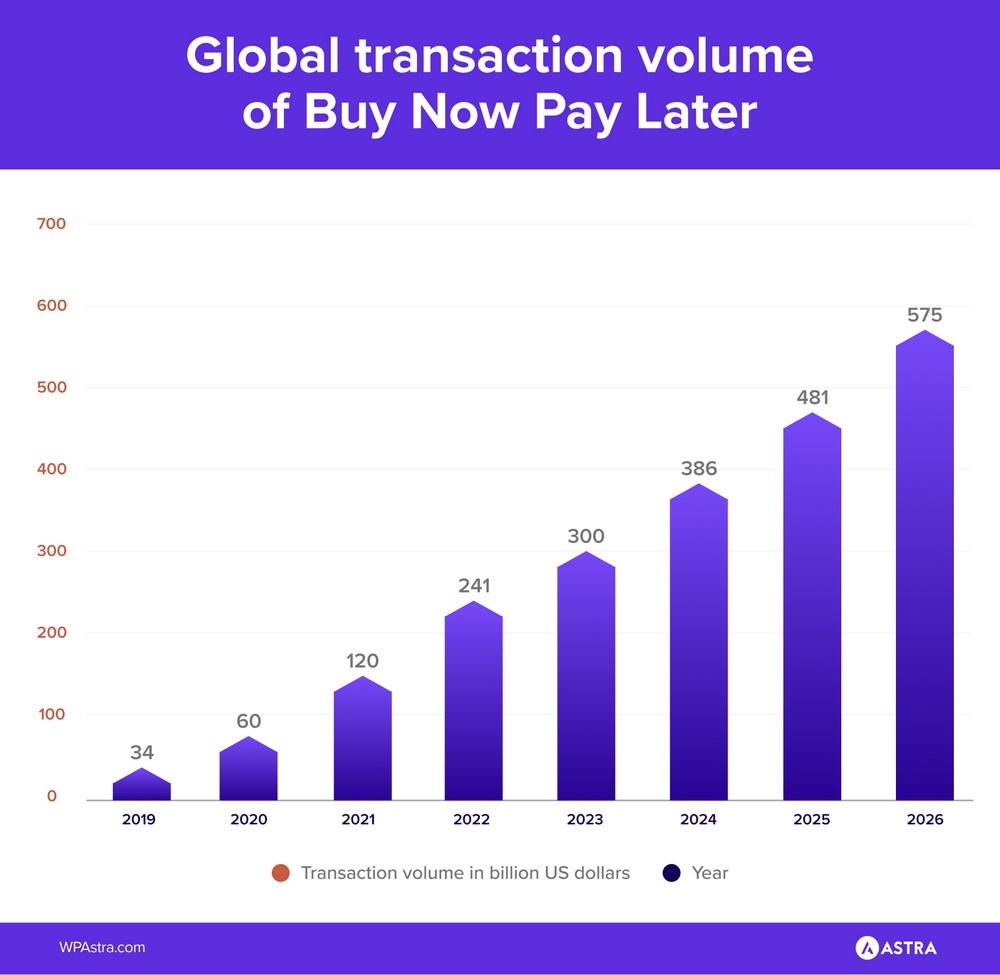
Global transaction volume of buy now pay later (BNPL) in eCommerce. Data source: Statista
Buy now pay later doesn’t necessarily mean deferring the whole payment to a future date. It usually means offering an installment plan which makes it easier to purchase more expensive goods or services.
Takeaway
Tools like SureCart also allow you to offer installment plans, which have similar benefits.
45% of consumers search online before a major purchase
Selling can be as much about offering reassurance and validation as actually selling products.
“When I plan a major purchase, I always do some research on the internet first” – Statista dixit
It’s no longer enough to have a fast and intuitive eCommerce website. You need to solve the doubts and concerns of your potential buyers too.
Takeaway
Users want to know what they’re buying. Offer that information and they will most likely reward you with a purchase.
Include reviews and testimonials on product pages. Provide FAQs, information or case studies and any research material relevant to what you sell.
Start a YouTube Channel or create a blog and:
- Record unboxings.
- Write detailed reviews.
- Compare similar items.
The more information you provide, the more research a visitor can do on the page. The more objections you overcome and the more questions you answer, the more likely they are to purchase.
Shopping via online streams is becoming increasingly popular across the globe
Live selling skyrocketed with Covid. Platforms such as Amazon Live and many others enable retailers to set up their own online shopping channel to demonstrate and sell goods.
According to Statista live stream eCommerce sales were valued at 17 billion dollars in the United States in 2022.
And it’s estimated to triple by 2026!
These numbers are even higher in the Asian market.
Takeaway
Selling through a live stream appears to be here to stay.
Clothing and fashion are the most popular product categories for this approach, but it’s worth experimenting with whatever you sell.
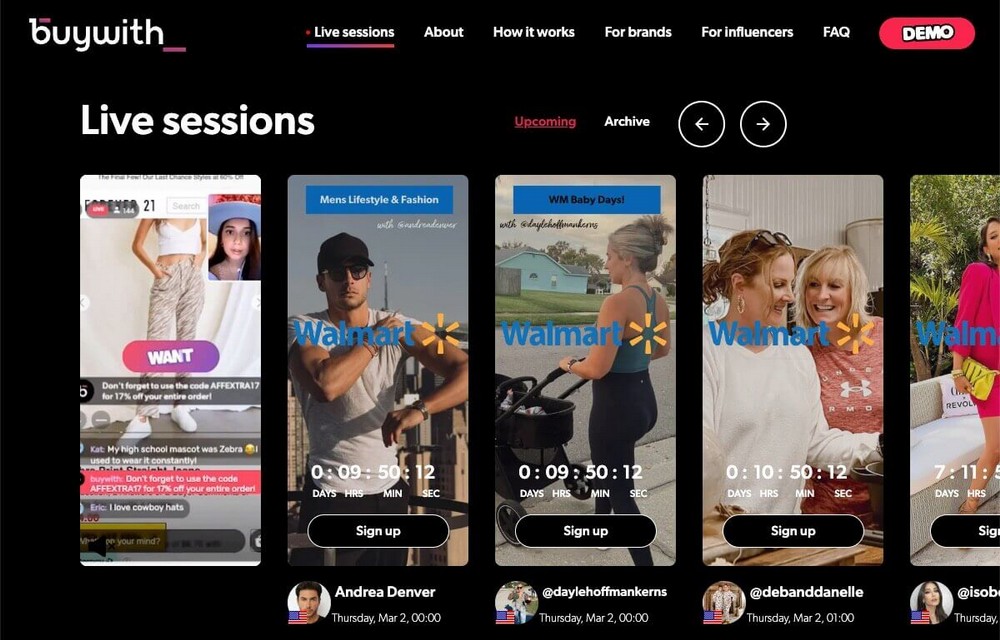
Use tools such as BuyWith to showcase your new products, answer questions and doubts, or collaborate with an influencer to boost sales even more.
61% of consumers prefer to be contacted by brands via email
Making your brand visible to new customers is quite an odyssey. Once you succeed, how are you going to keep in touch with them?
According to Statista, 61% of American consumers prefer to be contacted by brands via email.
Takeaway
This fact doesn’t mean that you should leave aside any other communication means such as social networks.
You only need two things for this:
- An email marketing platform like Mailchimp.
- A plugin like Convert Pro to capture email addresses efficiently.
62% of customers won’t buy from you again if your store is not optimized for mobile
Smartphones account for a significant part of the world’s internet traffic.
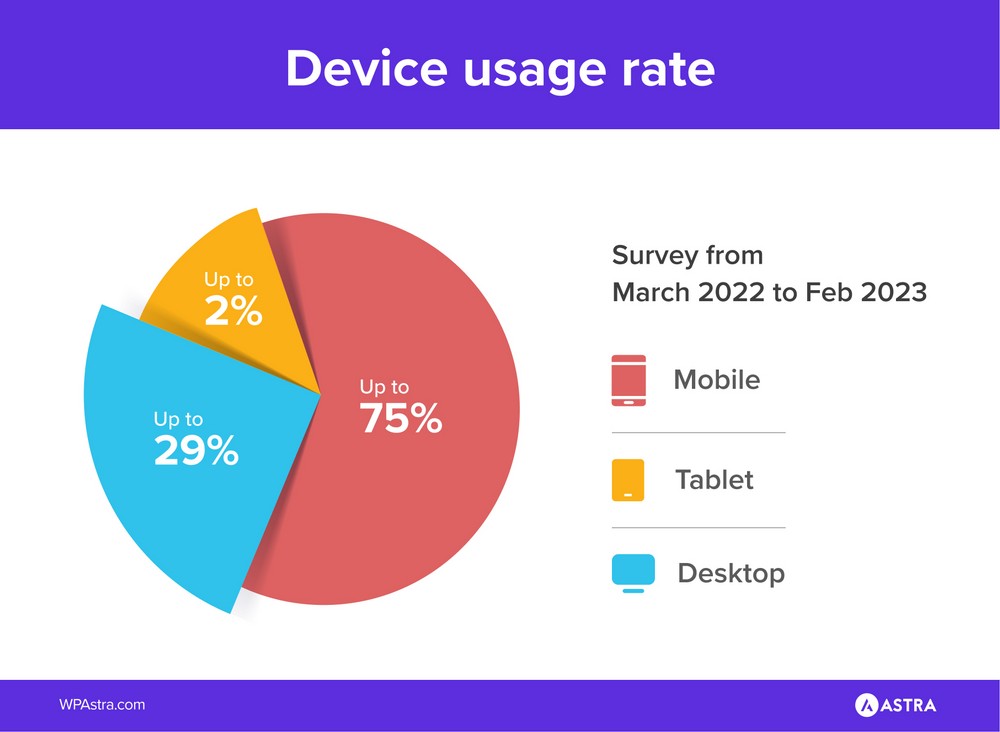
It’s not surprising that it’s one of the devices from which most purchases are made (up to 65% of users did so in the USA in 2022).
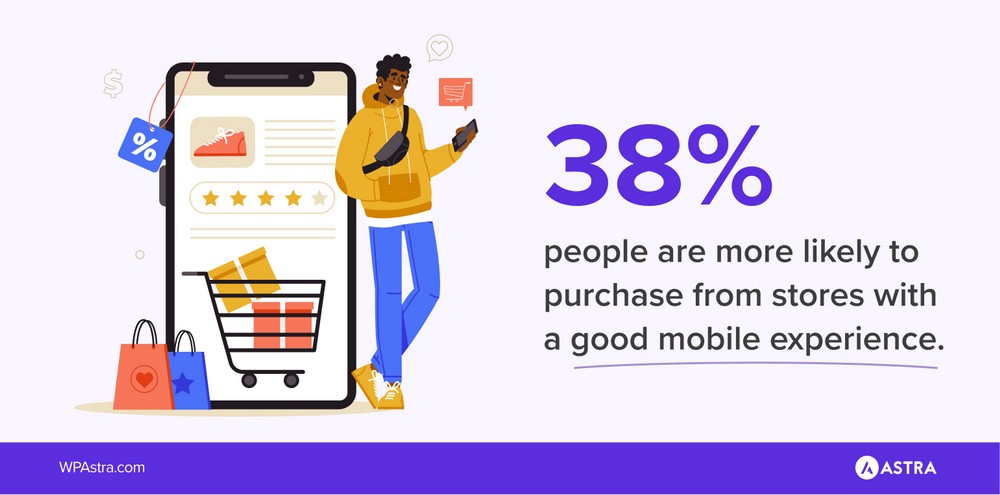
However, more than half of those users wouldn’t return to your online store if it’s not properly optimized for mobile.
Takeaway
Offer an excellent mobile shopping experience for your users.
This means:
- Optimize your page on a technical level so that it loads quickly.
- Optimize the design to be readable and easy to use on smaller screens.
- Make mobile payment easy by adding mobile wallets as a payment method.
70% of carts in online stores are abandoned
Think of all the effort you put to attract customers to your online store.
All for only 3 out of 10 to complete the purchase.
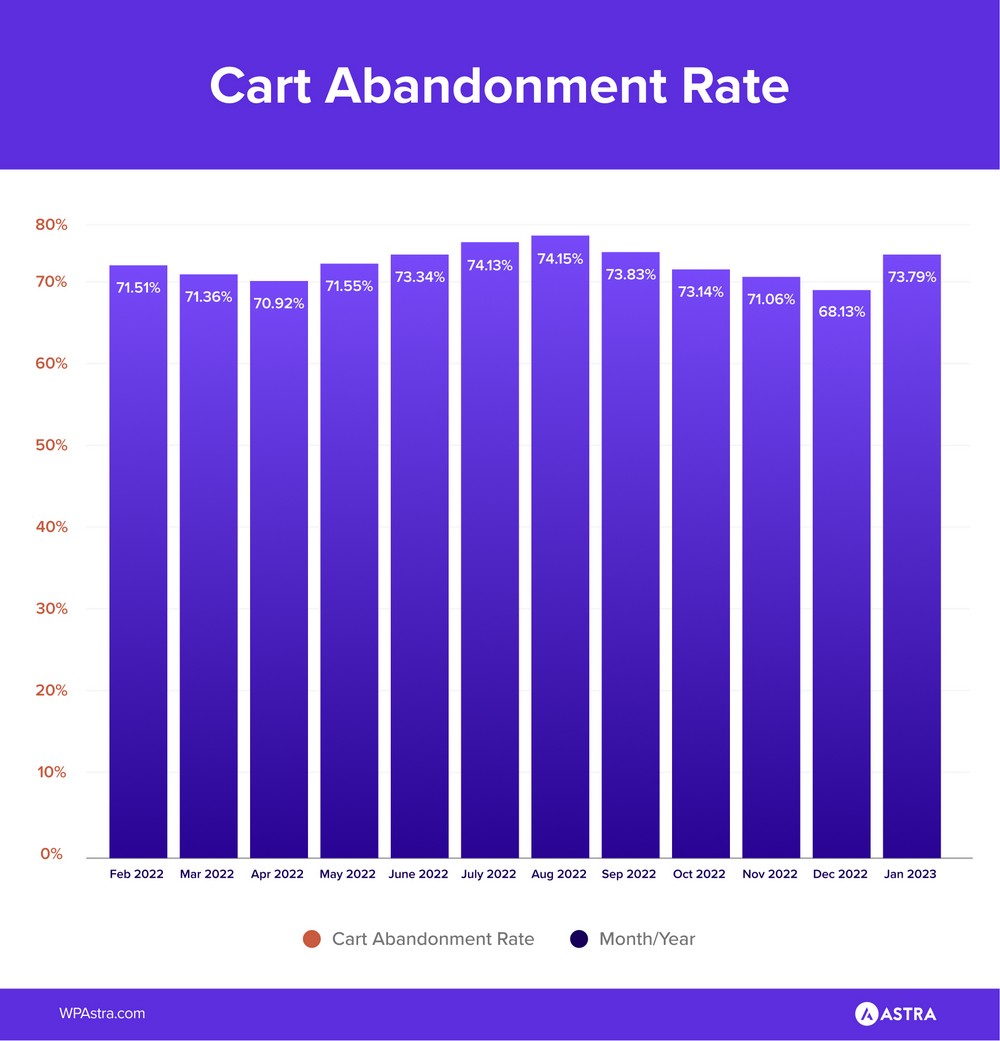
It’s a devastating statistic that every store has to work on to reduce.
Takeaway
There are many strategies you can follow to reduce cart abandonment.
Streamline the checkout as much as possible to reduce friction, avoid unexpected costs, keep delivery charges minimal and you should reduce that figure.
A very simple way to reduce this abandonment rate is to send a reminder email if someone doesn’t complete a purchase.
The results of this simple solution may surprise you.
Others like WooCommerce require an additional plugin for this feature.
Buyers are becoming greener
There is a growing concern about pollution and sustainability, especially with younger buyers.
That’s why many consumers consider the environmental impact of their purchases when making buying decisions.
According to Business Wire, more than a third of global consumers are willing to pay more for sustainable products.
Takeaway
This consumer behavior can lead you to take several different actions, but all pointing in the same direction.
Adopt more environmentally friendly practices throughout your store.
- If you sell your own product, create a more sustainable version.
- Use a more environmentally friendly transportation company.
- Donate a portion of profits to a green cause.
- Offer a product replacement program.
- Switch to recyclable or reusable packaging.
Leading your eCommerce store toward a more sustainable place will be good for your business and for everyone.
Afternoon and Friday are your allies for increasing sales
Have you ever wondered what time and day of the week people shop online the most?
The answer according to a Klarna study is pretty clear:
Fridays and 12 noon are the busiest time and day for eCommerce. At least for the US.
In other countries the sales peak is delayed to the evening (7/9 PM).
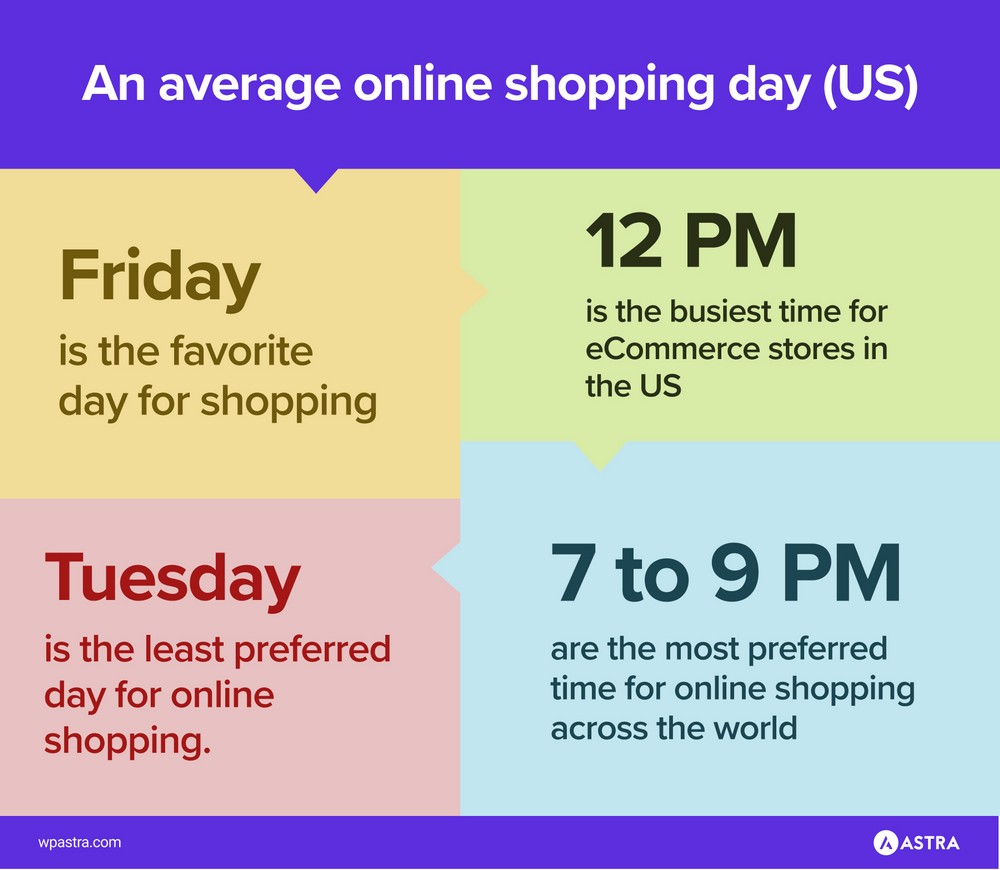
What doesn’t change so much is the favorite day for shopping, which is usually Friday.
Although there is also some difference depending on the country you choose.
Takeaway
One of the great advantages of eCommerce is that it will work and sell for you 24/7.
But when it comes to fine-tuning your results, try to use the relevant values of your country to maximize sales.
- You can send your promotional newsletters or schedule your live shopping on those days.
- Activate promotional coupons on your website or the ads on third-party platforms in the optimum time ranges.
8 out of 10 people won’t buy from you again after just one bad experience
A study by Khoros claims that 83% of customers cited good service as their most important criterion for deciding what to buy.
And according to Venture Beat, 76% of consumers would stop doing business with a company after just one bad experience
These are high percentages that every online store should take into account.
Good customer support can be the difference between winning or losing the sale.
Takeaway
Do your best to offer good customer service and make the customer aware of it.
Many of your customers may never need your help. But knowing that they can contact you quickly by email, a contact form, chat or phone, may encourage them to choose you over your competitors.
Promote your support as if it were a product.
Many years ago the most influential recommendations used to come from friends and family.
This trend has changed so much over time.
In 2022, and according to data collected by HubSpot, 30% of consumers reported influencer recommendations as one of the most important factors in deciding on a purchase.
Takeaway
Establishing a collaboration with an influencer is usually straightforward.
The vast majority will show their business email on their social networks where they are active.
The general recommendation if you’re considering doing this is to choose niche influencers who are respected in their industry.
Promoting a pair of sneakers through a beauty influencer will have less impact than if you collaborate with an influencer in the running space.
An exhaustive report by GWI tells us the main reasons that encourage users to complete an online purchase.
All of them will give you many ideas to improve your online store’s conversions.
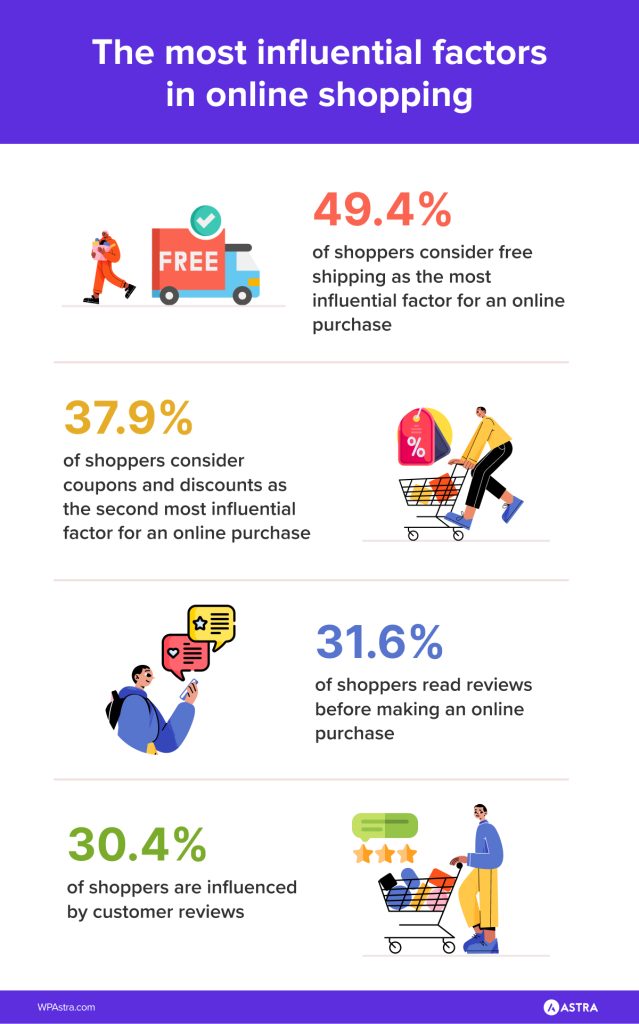
In this article you have already seen some of them:
- Knowing the product or company is eco-friendly.
- Ability to spread payments over time (buy now pay later)
- Live-chat box to speak to the company (good customer service)
All of them are important.
But the number one factor that is most important when it comes to completing a purchase is free shipping.
Takeaway
eCommerce customers love free shipping.
You can use this to your advantage by offering free shipping:
- Using minimum order value to increase the average spend.
- On special occasions to generate scarcity.
- Only to your newsletter subscribers.
- Or only to members of a yearly payment plan to generate more loyalty.
- Or just add the cost to the price of the item.
These are just a few ideas that you can put into practice.
If you come up with more, share them in the comments below!
As you’ve seen, offering free shipping is one of the key ways to encourage a user to complete a purchase.
But this is not the only decisive factor.
According to Metapack, these are the five major concerns regarding shipping:
- Cost
- Speed
- Convenience
- Return policy
- Visibility
Takeaway
Improve the points mentioned above in relation to shipping:
- Costs: If you can’t offer free shipping, at least make it as affordable as possible.
- Speed: Offer an option to receive a package fast, even if it’s a more expensive alternative.
- Convenience: Use companies that offer modifiable time slots, or work with pick-up points that make life easier for the buyer.
- Return policy: Explain in detail and be as generous as possible regarding returns. Returns are one of the biggest concerns of online shopping.
- Visibility: Offer item tracking, both the status of your products and their location to keep your customers informed and happy.
If you’re considering starting your own eCommerce business but are still not sure which category people invest in the most, Statista has the answer:
Fashion.
Followed closely by electronics ($767 billion) and toys, hobbies and DIY ($600 billion).
Takeaway
If you have an eCommerce store selling third-party products, consider increasing the selection to include one or more of these categories.
We often think of eCommerce as online stores where we buy physical products that are delivered to our homes.
Although eCommerce stands for electronic commerce, it’s not uncommon to overlook the fact that digital product sales are booming.
In the same GWI study we mentioned before, we also found that 71.5% of internet users aged 16-64 pay for digital content each month.
Takeaway
Consider adding digital products to your catalog.
Ebooks, audio, video, digital assets, courses or even consulting could help you tap into what is a hugely lucrative market.
In the traditional eCommerce model the customer pays to receive one or more products on demand.
That’s not the only way to operate.
The revenue of companies that use a subscription-based business model is growing steadily.
Subscription in eCommerce means that customers pay a recurring monthly or annual fee to receive a product on a recurring basis.
An example could be BarkBox, which sends a monthly box of pet products.
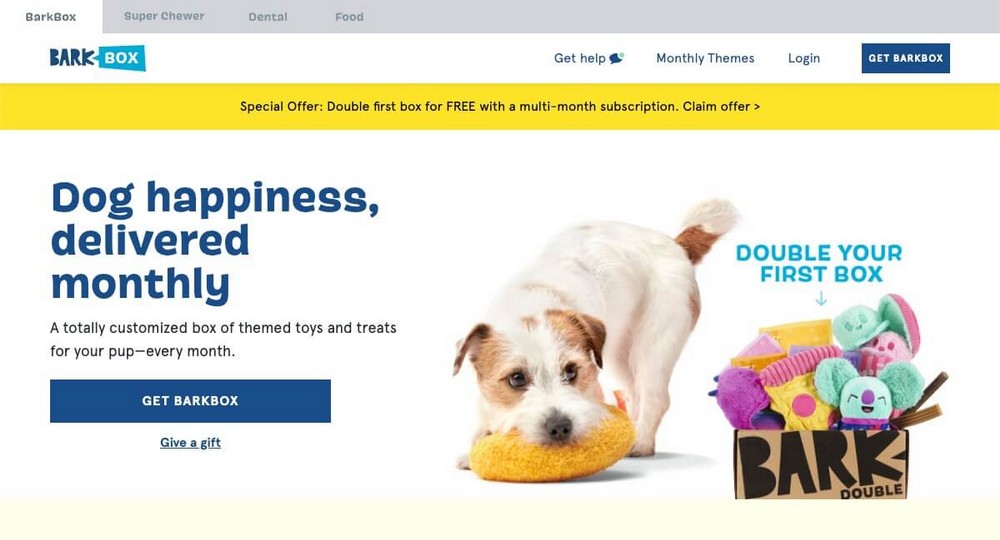
Takeaway
Try to implement a subscription model in your store to build customer loyalty and have a more stable income.
There are two general ways to do this:
- Send recurring perishable products: The typical example would be beauty products. But you can also send a book a month, a puzzle, or anything else you can think of.
- Create loot boxes: Select and add different types of products for a specific audience: DIY kits, pet products, or food to try a new recipe a week.
As long as the product fits the model and offers genuine value, it could be a great earner!
This is the opinion of more than 90% of the companies consulted by Econsultancy.
As we mentioned at the beginning of this article, we live in a world surrounded by data. The best thing you can do is use it to your advantage.
If you offer the same shopping experience to all your customers, you’re not leveraging the full potential of your eCommerce.
Takeaway
A powerful CRM like HubSpot will help you keep all your customer data properly organized and accessible to take specific actions based on it.
For example, offering a discount if the customer visits a product page but doesn’t buy, or reach out if they visit many similar products in the same category without completing a purchase.
A word of caution here.
Customers are also becoming increasingly concerned about their privacy and the use of their data.
If you put this strategy in place, explain properly to your customers what information you’ll collect, and above all, why it will be beneficial to them.
According to a study by Thredup.
This goes hand in hand with the fact that customers are becoming more environmentally conscious.
Do you think resale would affect your brand image?
Think again, big brands such as Amazon and Apple have been offering refurbished products for years!
Takeaway
A smart way to do this is to offer to buy back old purchases from customers in exchange for a discount on their next order.
Part exchange offers easy money and a simple way to make space for a replacement. All while helping keep more items out of landfill.
The other benefit is that another customer will be able to benefit in a more economical and environmentally friendly way.
According to Invespcro, more than 54% of US digital shoppers have made an online purchase from a foreign website in the past.
If you have an eCommerce store, you’re no longer limited to selling to your customers locally, to your own city or country.
Consumers are gradually losing their fear of shopping abroad and seem to be embracing it.
Takeaway
Allowing your products to be purchased from more places in the world will help you reach more potential customers.
One of the most important factors here would be to translate your website so that it is available in the native language of the country where you want to sell.
This is especially interesting in Europe, where countries are very close to each other, and different languages are usually spoken in each of them.
Almost 90% of consumers shop online for holiday gifts.
And this trend will be repeated throughout the year: Valentine’s Day, birthdays, anniversaries, Mother’s Day and Father’s Day, among many others.
There is always an occasion for a gift. It’s a trend that will hardly disappear.
Takeaway
Get your online store ready to make life easier for gift-givers.
- Sell gift cards.
- Offer gift wrapping (better if free!)
- Add the option to include a personalized message.
- Make it easy for the person receiving the gift to return it.
- Hide sensitive information such as the price of the product.
eCommerce offers many advantages, but also some disadvantages, especially for the buyer.
One of them is not being able to actually see the physical product.
This is where augmented reality can play an essential factor in increasing sales.
According to Statista, by 2025 one in three shoppers in the United States will have used AR-powered technology when buying products online.
Takeaway
At the moment it’s a bit complex to implement AR in your eCommerce store unless you use a specific tool like Shopify AR.
If you have the knowhow and it would fit your niche, we recommend getting in on the action.
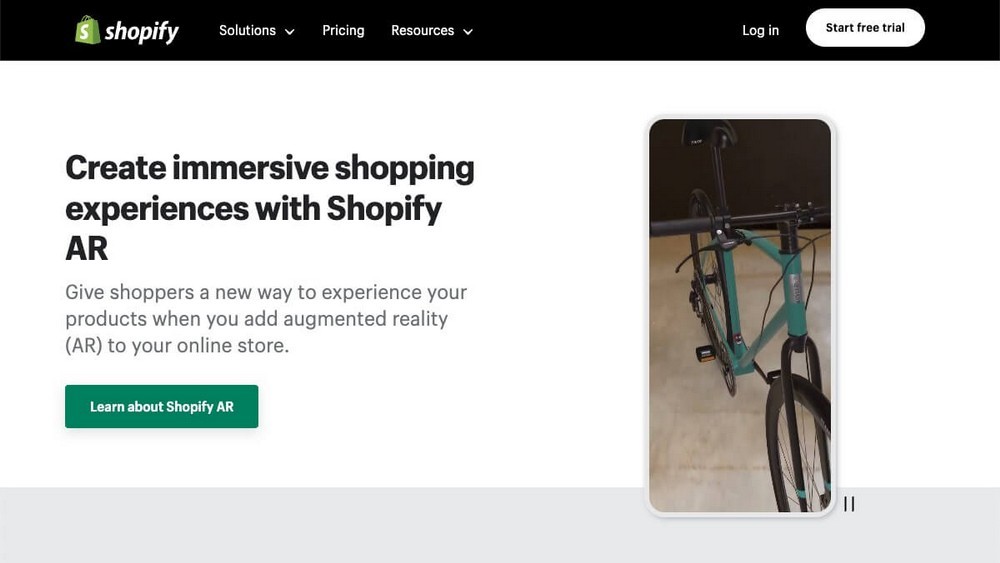
While more options appear on the market, Here are some examples of large companies using augmented reality to enhance their customers’ shopping experience.
If you take a look at the statistics that Statista has prepared about the Metaverse you’ll understand why we have added this point here.
It’s estimated that the Metaverse eCommerce industry will generate a revenue of $5.7 billion by 2023.
With an estimated growth rate of almost 40% the projected market volume for 2030 is $58.07 billion!
Takeaway
The Metaverse has both supporters and detractors.
Although the actual numbers may not be close to those planned, they are figures to at least consider making some tests around this field.
Metaverse is a complex concept to explain here, so we recommend reading this guide to learn more about it.
Then, if you can implement it in your store somehow, we recommend preparing as much as possible as the Metaverse is coming!
Wrapping up
In summary, thanks to the different statistics we analyzed, we recommend you should:
- Allow payments with digital wallets, and offer buy now pay later options.
- Provide relevant content that solves potential doubts of your buyers.
- Sell through live streams and with the help of influencers.
- Contact your customers via email.
- Be optimized for mobile.
- Reduce cart abandonment, since it’s one of the biggest conversion leaks.
- Work with sustainability in mind. Even reselling used or repaired products.
- Take advantage of the days and times when shoppers are most active.
- Offer quality customer service.
- Offer free or inexpensive, fast and well-tracked shipping.
- Offer products in the fashion category since it’s one of the largest.
- Sell not only physical products but also digital ones.
- Sell subscriptions to physical products in addition to one-time on-demand purchases.
- Personalize the shopping experience for customers.
- Sell abroad.
- Have features to help people who want to buy items as gifts.
- Adapt to new technologies such as AR and the Metaverse.
Which stats or facts surprised you the most?
Tell us about it in the comments below!
Disclosure: This blog may contain affiliate links. If you make a purchase through one of these links, we may receive a small commission. Read disclosure. Rest assured that we only recommend products that we have personally used and believe will add value to our readers. Thanks for your support!
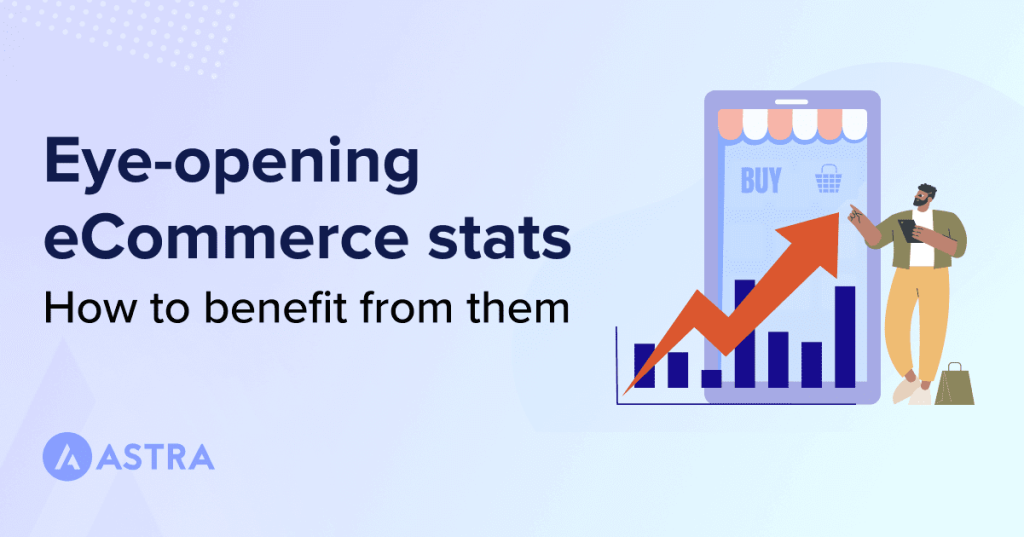





Thank you for sharing such an insightful post! Your blog truly captures the essence of the technological revolution, showcasing the incredible advancements that are shaping our world. It has become a go-to source for staying informed about the latest in the tech world while also fostering a deep appreciation for the responsible use of technology. I eagerly look forward to reading more of your future posts and embarking on this tech journey together!